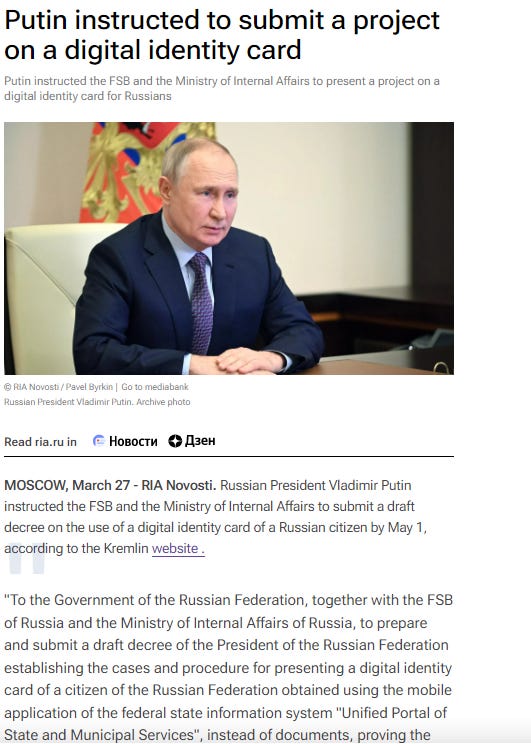Russians outplay digital IDs, again
A nationwide boycott threatens another Kremlin-endorsed cattle tag
FC Rostov averaged 30,000 spectators in 2018/19; now the Russian football club struggles to fill 7,000 seats.
Spartak Moscow’s Otkritie Bank Arena has a capacity 45,000 people (although maximum capacity was reduced by the Ministry of Internal Affairs to 15,000); less than 4,300 fans showed up for Spartak’s first game of the 2022/23 season.
A grand total of 207 people watched the March 11 match between FC Ural Yekaterinburg and Torpedo Moscow—the second-worst attendance in the history of the Russian Premier League (RPL).
On average, attendance at RPL matches has decreased by four times compared to the pre-COVID 2019/20 season.
Russian football clubs are ready to pay people to attend their matches, according to RT.com.
The Russian government’s curious decision to make Fan ID—a profoundly unnecessary electronic identity document—mandatory for stadium-goers (including infants) has predictably resulted in slow-motion seppuku for the RPL.
And now the backpedaling has started.
Pavel Pogrebnyak, a former striker of the Russian national football team, predicted at the end of March that Fan ID would be canceled.
A press conference held a week later by Spartak stars of yesteryear called for a “compromise” to end the nationwide boycott of football matches.
A year after defeating QR-coded “health” passes, Russians are on the verge of vanquishing a different, but similarly deranged and gratuitous, digital ID.
There’s a lesson here, somewhere.
The rise and fall of Fan ID
The Fan ID system debuted during the 2017 Confederation Cup and 2018 World Cup, which were hosted by Russia. Issued as laminated badges, Fan IDs served as visas for foreign football enthusiasts, and granted free travel in public transport. The ID was also deployed during the 2021 European Championship—St. Petersburg hosted seven matches of the tournament.
After the success of the World Cup, Russian President Vladimir Putin called for Fan ID to become a permanent fixture of cultural and sporting events in the country.
Fan ID had a clear benefit for foreign visitors to Russia, but its advantages were more difficult to ascertain when it was retooled as a domestic ID for sports fans.
Alexander Dyukov, president of the Russian Football Union, said in 2019 that using Fan ID in the RPL would be expensive, pointless and inconvenient.
Besides, Russian stadiums were equipped with sophisticated CCTV cameras and other fancy security gadgets. What would be the point of forcing spectators to obtain a special ID just to watch athletes kick a ball around?
Dyukov’s level-headed approach to football security prevailed until November 2021—when 408 fans were detained at VEB Arena stadium for participating in an unauthorized pyrotechnics display.
Curiously, the stadium’s CCTV cameras had been disabled, “forcing” police to make indiscriminate arrests. State media claimed hackers were responsible for the bizarre surveillance camera outage, but the incident was never investigated.
Almost overnight, Fan ID was back on the menu.
As Vedomosti reported:
After this incident, law enforcement agencies had an important trump card in their hands. If cameras in stadiums fail, then Fan IDs could be an important tool for identifying an individual and determining personal responsibility.
The rest is history.
Signed into law in December 2021 by Russian President Vladimir Putin, the Fan ID system allows authorities to deny citizens the right to attend football matches if they “violated public order” at previous sporting events, or even if there is “data” that suggests the intention of committing future unlawful acts.
So basically Russians can be permanently barred from football stadiums if they are accused of a pre-crime.
The laminated card has been replaced with something more chic. The domestic version of Fan ID (officially called “Fan Card”) is a digital identification document that can only be obtained through the Russian government’s State Services e-portal, Gosuslugi. Coincidentally, Gosuslugi is being merged with Russia’s Unified Biometric Database. Everything is completely voluntary, of course.
For Russians, Fan ID has always been a transparent scam. In a November 2020 interview, a representative of a Spartak fan association observed:
As we know, all sorts of bad things are done behind the façade of words like “peace” and “security”.
They are trying to accustom us to a digital system through Fan ID. In the original version, it was a card with a personal barcode. Now they are making a QR code that will be embedded in a phone app.
Around the world, digital innovations are being implemented at a rapid pace in connection with the coronavirus … 5G towers are being introduced everywhere, face recognition, and using algorithms that analyze the actions of each person— the movements of his body, even without a face—they can understand what kind of person he is. It is the digitalization of everything and everyone.
I have a positive attitude towards innovations, but let’s use them for the economy, for real things that will save us from unnecessary work. They are coaxing us: “You can drink beer at the stadium, and you will receive bonuses, just accept the QR code, it’s so simple, download the application, and that’s it” … Then all the data about us will be sewn into this QR code, and we will only live with this QR code.
Dude called it.
The blowback from Fan ID will likely result in serious financial trouble for the RPL, Russian media reports.
So is the federal government having second thoughts about this universally despised cattle tag system?
Putin calls for making tagging system more convenient
Measures must be taken to “simplify the use of football fan identification systems by citizens, primarily the disabled, pensioners and children,” Putin instructed his cabinet on March 25.
In the same order, the Russian president told the FSB and the Ministry of Internal Affairs to prepare a draft decree on the use of digital identity cards (digital copies of the domestic passport).

When Putin publicly supported the national vax pass—possibly the most unpopular piece of legislation in Russia’s modern history—he bravely stipulated that the ill-fated federal cattle tag system should be made as “clear and understandable” as possible.
“Don’t get rid of it, just make it more convenient.”
Remind you of anything?
Anyway.
We bow before the Russians, the champions of defying despotic digital IDs.
But there are questions, questions …. and grave challenges ahead.
If you enjoy Edward Slavsquat maybe you would enjoy subscribing? There are Perks (free Fan ID).





Good for the Russian people! Sadly, I expect that in the soft, corrupted western countries like Canada, the emasculated population won’t readily give up their selfish pleasures.
This is the Ghandi solution. The system only works - if we comply.